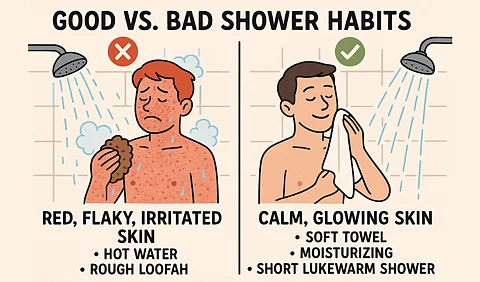Hot water may feel therapeutic after a stressful day—relaxing tense muscles and calming the mind. However, this comforting ritual might be quietly damaging your skin over time, especially if practiced frequently and without the right precautions.
Hot water strips the skin of its natural oils, known as sebum, which are essential for maintaining adequate hydration and elasticity. These oils form part of the skin’s protective barrier. When removed, the skin becomes more vulnerable to environmental damage, leading to increased dryness, flaking, irritation, and eventually the formation of fine lines and wrinkles. Over time, this repeated damage can contribute to premature aging of the skin.
Dermatologists highlight that one of the first signs of accelerated skin aging is the breakdown of collagen. Hot water contributes to this by triggering inflammation in the skin. Inflammatory processes reduce the skin’s ability to produce collagen and elastin, two proteins that give the skin its firm, supple, and youthful structure. Loss of these proteins leads to sagging and the appearance of fine lines and wrinkles.
Furthermore, excessively hot and prolonged showers can worsen pre-existing skin conditions such as eczema, rosacea, and psoriasis. This occurs because hot water alters the skin's microbiome—the community of beneficial bacteria that help maintain barrier function and immunity. It also increases transepidermal water loss (TEWL), which causes the skin to lose moisture more rapidly, worsening dryness and sensitivity.


